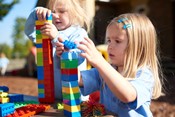The Importance of the Early Years Foundation Stage Farlington School’s Nursery Manager, Lucy Bedwin
18 Jan 2016

I believe that each provider should not just be content to work to the EYFS framework standards, but endeavour to provide the best possible care and early education possible. The aim, which we strive for at Farlington Nursery, is to create a foundation of knowledge and skills for each child, to prepare them for school and future education.
The reformed EYFS, effective from September 2012, takes forward the Government’s changes to the 2008 framework as recommended by the 2011 Tickell Review.
The reforms were put in place to:-
- Reduce paperwork and bureaucracy;
- Strengthen partnerships between parents and professionals;
- Focus on three prime areas of learning most essential for children’s readiness for future learning and healthy development;
- Simplify assessment at age five; and
- Provide for early intervention, where necessary, through the introduction of a progress check at age two.
Areas of learning and development now consist of three prime areas and four specific areas. The prime areas are:
- Communication and language;
- Physical development;
- Personal, social and emotional development.
The framework suggests that these prime areas are the most essential for a child’s healthy development and future learning. As children develop, the prime areas will help children to acquire the skills needed to progress to the four specific areas:
- Literacy;
- Mathematics;
- Understanding the world;
- Expressive arts and design.
It is stated in the framework that these seven areas of learning and development must shape educational programs in the early years setting. All the areas of learning and development are important and inter-connected.
Children are born ready, able and eager to learn. They actively reach out to interact with other people and the world around them. However, development is not an automatic process, it depends on each unique child being given opportunities to interact in positive relationships and enabling environments.
At Farlington we cater for each individual; every child in Nursery has an individual learning programme that grows with them, week by week. Young children only need to have teeth coming through or a cold and they can regress a little, but just as quickly can surge forwards. It is very important not to push a child forwards or they wouldn’t want to come to Nursery but equally children should not be held back and made to tread water; if they think we have lost interest in taking them forward on that day, momentum is lost and the child’s confidence can suffer as a consequence.
There is also a vast difference in children who are born in September to those born in August; if you consider when the September babies are almost walking, the August babies are being born. Therefore it is paramount that all learning activities are carefully planned, well structured and supported, within enabling environments to ensure that all children have appropriate experiences, which will allow every child to move to any Reception class with confidence, social awareness and a readiness for learning. Educating for confidence is central to our Nursery.
In order to achieve these high standards, the children are obviously the main priority but in order for children to be happy and flourish in our care, we have to capture the central nerve of an early years’ child… their parents!
Parents are a very important asset to any Nursery, if a Nursery mum or dad is already worrying about walking into a setting before they have left home, the child is also fretting, nothing needs to be said – children feed from emotion and innate feeling. It is very important, therefore that parents see us as partners. In order to achieve this a very slow settling process is needed before the child is three, where the parents come to ‘play’ with their child for an hour or so, building up to the parent leaving for a short while till both child and parent are separated happily! That is not where the partnership should end and we continue to have what we call an ‘open door policy’ where parents can join us at any time. We encourage parents not to wait for a parents’ evening if they have any concerns and we endeavour to see parents the same day or within 24 hours.
Generally children build up their hours from our minimum requirement of 3 sessions to 5 full days, preparing them for statutory full-time education in Reception. This prepares children for the next stage in their school career whilst allowing them to enjoy time at home with their primary carer.
The end of a child’s nursery education is a special time and marks the start of formal, full-time education. It is a memorable, celebratory time for both the children and their parents; each child should leave feeling a special, valued individual.
Farlington School – West Sussex